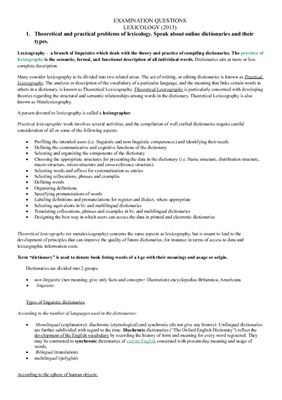Экзамен, МПГУ, Россия, Морозова Н.Н., 2013. — 40 c.
Theoretical and practical problems of lexicology. Speak about online dictionaries and their types.
The peculiarities of communication: informal vocabulary.
Local and social dialects in English.
How can a new object or notion get a name in the language? Use different examples of neologisms to prove your idea. Formal words, their role in the process of communication. Terminology.
Prove that borrowings may be grouped so as to show what each notion has leat from the others. What are the peculiarities of Scandinavian loan words?
Apply the theory of assimilation to loan words in English and show different groups of Latin borrowings.
Why is English vocabulary more Romantic than Germanic? Speak about different groups of Latin borrowings.
Speak about different types of morphemes in English and their meaning. What role do they play in the process of word-building? Speak about derivation as a productive type of word-building.
Speak about the impact of Norman invasion on English vocabulary. How do loan words of the period differ from Parisian borrowings?
Explain why conversation is considered to be the sign of flexibility of English.
Speak about the semantic and structural variety of compound words.
Speak about abbreviations, shortenings and blends. Show their main spheres of usage in contemporary English.
Different approaches towards lexical meaning of the word. Linguistic context: its role and function.
The associations based on likeness. Analyze cognitive metaphors in business English. Prove that they reflect the development of consciousness.
What are the results of the semantic development of the word?
Metonymy, its types. Speak about the semantic relations between proper and common nouns.
Show how the principle of duality is reflected in different definitions and classifications of synonyms.
Speak about different types of euphemisms in English. In contemporary English euphemisms are used to give a new look to old notions. How do you understand the quotation?
Paradigmatic relations of words: antonyms, hyponyms.
By giving your own examples show different approaches to the classification of phraseological units.
Proverbs are defined as self-contained pitchy traditional expressions with didactic function and fixed poetic form. How do you understand the definition? What is the difference between proverbs and sayings?
Speak about the difference between phraseological units and free word combinations? How do idioms appear in English?
American English: a mew language or a variant? Prove your point of view by analyzing the differences within the system of the vocabulary and spelling norms.
Speak about different types of homonyms in English. How do homonyms appear in the language?
English as a global language. The future of English. David Crystal and his views on the issue.
Linguo-cultural aspect and usage of phraseological units containing personal and place names.
English as a lingua franca.
Speak about a method for identifying multi-word units of analysis in language.
Give a semantic classification of synonyms worked out by G.B.Antryshina.
Theoretical and practical problems of lexicology. Speak about online dictionaries and their types.
The peculiarities of communication: informal vocabulary.
Local and social dialects in English.
How can a new object or notion get a name in the language? Use different examples of neologisms to prove your idea. Formal words, their role in the process of communication. Terminology.
Prove that borrowings may be grouped so as to show what each notion has leat from the others. What are the peculiarities of Scandinavian loan words?
Apply the theory of assimilation to loan words in English and show different groups of Latin borrowings.
Why is English vocabulary more Romantic than Germanic? Speak about different groups of Latin borrowings.
Speak about different types of morphemes in English and their meaning. What role do they play in the process of word-building? Speak about derivation as a productive type of word-building.
Speak about the impact of Norman invasion on English vocabulary. How do loan words of the period differ from Parisian borrowings?
Explain why conversation is considered to be the sign of flexibility of English.
Speak about the semantic and structural variety of compound words.
Speak about abbreviations, shortenings and blends. Show their main spheres of usage in contemporary English.
Different approaches towards lexical meaning of the word. Linguistic context: its role and function.
The associations based on likeness. Analyze cognitive metaphors in business English. Prove that they reflect the development of consciousness.
What are the results of the semantic development of the word?
Metonymy, its types. Speak about the semantic relations between proper and common nouns.
Show how the principle of duality is reflected in different definitions and classifications of synonyms.
Speak about different types of euphemisms in English. In contemporary English euphemisms are used to give a new look to old notions. How do you understand the quotation?
Paradigmatic relations of words: antonyms, hyponyms.
By giving your own examples show different approaches to the classification of phraseological units.
Proverbs are defined as self-contained pitchy traditional expressions with didactic function and fixed poetic form. How do you understand the definition? What is the difference between proverbs and sayings?
Speak about the difference between phraseological units and free word combinations? How do idioms appear in English?
American English: a mew language or a variant? Prove your point of view by analyzing the differences within the system of the vocabulary and spelling norms.
Speak about different types of homonyms in English. How do homonyms appear in the language?
English as a global language. The future of English. David Crystal and his views on the issue.
Linguo-cultural aspect and usage of phraseological units containing personal and place names.
English as a lingua franca.
Speak about a method for identifying multi-word units of analysis in language.
Give a semantic classification of synonyms worked out by G.B.Antryshina.

